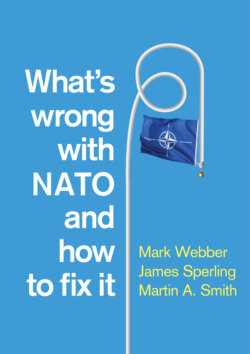Читать книгу What's Wrong with NATO and How to Fix it - Mark Webber - Страница 26
Liberal Ideas and Liberal Order
ОглавлениеNATO’s task expansion has been made possible by alliance institutions, given shape by allied politics and driven by American ambition. Allied calculations here are best understood as ‘interests’. But interests co-exist with ideas – the beliefs which provide the broader setting of action, a desirable end state in its grandest sense and, linked to that, a roadmap that provides answers to why and how a particular course of action should be taken.47 Measuring the influence of ideas upon policy is a complex business, but in NATO’s case the task is made a little easier because the Alliance has explicitly articulated an ideational rationale for its endeavours.
The relevant ideas have been described by commentators as ‘Atlanticist’ or ‘multilateral’, but ‘liberal’ is the term which has stuck. In the Cold War, NATO’s liberal identity was, in part, a projection of the allies’ domestic democratic systems. But it was also defined in juxtaposition to NATO’s communist ‘other’, the Soviet bloc. The end of the Cold War’s ideological divide meant the liberal appellation became fuzzier. In its political (as opposed to economic) formulation, it has revolved around a belief in the sanctity of rights and the related position that such rights are universal and should be both protected and promoted – a view that goes back to the formation of the UN in 1945 and the adoption of the Universal Declaration of Human Rights in 1948. During the Cold War, NATO’s defence of liberal values was very much symbolic (hence the toleration of some distinctly non-democratic members among NATO’s ranks). But the seeming victory of ‘freedom, democracy, human rights and the rule of law’ at the Cold War’s end opened up new historic possibilities.48 The Clinton administration took the view that NATO, through enlargement and partnerships, should assume a new liberal mission of democracy promotion. This, moreover, would have geopolitical benefits. Democracies were viewed as essentially peaceable in their relations with each other. As NATO membership spread, therefore, so, too, would inter-state peace.49 Subsequent enlargements stuck to this narrative. The ‘big bang’ enlargement of 2004 sat explicitly with President George W. Bush’s ‘Freedom Agenda’. Obama commended Albania and Croatia’s entry in 2009 as contributing to domestic reform and regional stability.50 The Trump administration, not known for its support of democracy abroad, welcomed the entry of North Macedonia (NATO’s most recent member) in similar terms.51
NATO’s promotion of liberal values has also occurred through more direct intervention. Operation Allied Force of 1999 provided the template in this regard. As UK Prime Minister Tony Blair argued at the time, the mission was necessary to reverse Serbia’s ethnic cleansing of Albanian Kosovans – it was ‘a just war based not on any territorial ambitions but on values’.52 David Cameron and Barack Obama provided similar justifications a decade later for the NATO intervention in Libya to stop attacks by the Qaddafi regime on its civilian population.53 In between sat the long NATO mission in Afghanistan. Here, the connection to liberal values was more obscure. But alongside its counter-terrorism and counter-insurgency rationale, ISAF was also justified as improving ‘governance, and economic and social development’.54 In that sense, it was of a piece with NATO’s earlier efforts in the Balkans – in Sten Rynning’s phrase, at ‘the heart of a wider liberal order’ of nation-building, humanitarian standards and stabilization.55
However noble its motives, the upshot of this liberal impulse has been a lack of restraint. The abstract quality of values or ideas gives them a universal and expansive application. NATO has attempted to instantiate those ideas through expeditionary nation-building, the management of global security and the spread of liberal market democracy. In consequence, Patrick Porter suggested in 2010, NATO had become unbound, cast loose from its traditional ‘demarcated sphere’ of activities, and facing the world with a sense of unlimited responsibility.56
